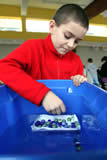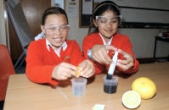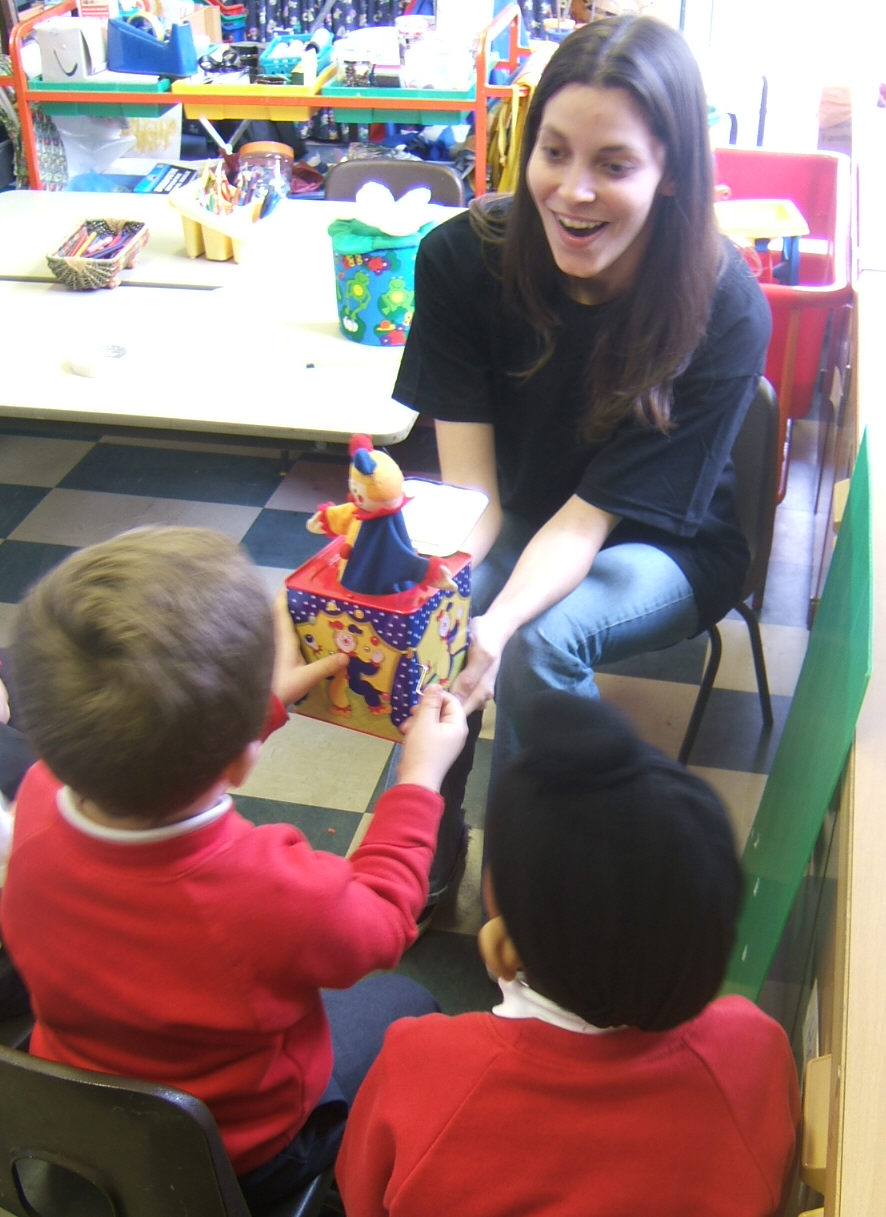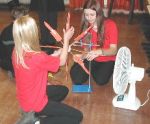 |
Return to Home page. | |
Links: |
WorkshopsContact us at spherescience@yahoo.co.uk or click here to complete our online form.
Available Workshops
All our workshops support the overall aim of the National Curriculum to “develop understanding of the nature, processes and methods of science; to answer scientific questions about the world around” and cover the statutory requirements to teach “practical scientific methods, processes and skills through the teaching of the programme of study content”. Our workshops are practical, exciting and inspiring. Primary workshops
Secondary workshops
PricingA full day of workshops will cost £400 (+ VAT). We usually deliver the same workshop in each session. The Royal Society of Chemistry's Outreach Fund is designed to give financial support to individuals and organisations in order to enable them to run chemistry-based events and activities. More details are available from the Royal Society of Chemistry.
We specialise in practical
workshops with activities available for Foundation Years, KS1/2, and
KS3/4. All our Workshop Leaders have successfully passed an enhanced DBS check. If a school cancels a booking at less than two weeks' notice, Sphere Science Ltd reserves the right to invoice the school for the full cost of the work commissioned. As we work in schools, there might be a few days' delay in replying to your enquiry.
Primary Workshop DetailsOur workshop programme is extremely popular so the more lead-time (and choice of dates) you can offer, the better. Some workshops are available in all areas - these are indicated by an asterisk below. Three workshop sessions will usually fit into a school day. Workshops are designed for a class of about 30 children with their class teacher. These workshops are designed specifically to develop pupil skills. Notes are provided as support for the teacher to follow up the workshop. We hope that teachers will use the workshop ideas in their own teaching. * = Some of the workshops need extra support - either adults or pupil helpers. Pupil helpers will have an opportunity to develop science communication skills so the pupils selected to help need to be alert, fairly competent and likely to benefit from taking part in the session. ~ = Not available in all areas National Curriculum (England & Wales) links
International Primary Curriculum links
Secondary Workshop Details All our workshops encourage curiosity in science with investigations of variables that can be changed quickly to enable students to collect data and/or assess results.
click here to download details
Students each build and test a buggy powered by a balloon. They work out all the independent variables and choose one to investigate its effect on a dependent variable. They can retain their buggies for further testing. Space required: hall Time: 90 minutes
Students use different forms of chromatography (including radial and ascending) before investigating out to separate the pigments in grass. Space required: laboratory or classroom with sink Time: 90 minutes Students investigate the amount of Vitamin C in different fruits using DCPIP solution. They need to identify and control all variables to produce accurate results. Space required: room with at least one accessible sink. Time: 90 minutes
Students each build and test a wind-up toy to determine the optimum value for each variable. They can retain their toys for further testing. Space required: hall Time: 75 minutes
Students carry out ten simple investigations (all are either physical or chemical changes) which require them to follow written instructions carefully and make accurate observations. Space required: laboratory or classroom with sink Time: 90 minutes
Students investigate different electrical circuits (including the use of different components) using solar cells in lieu of batteries. Space: classroom and outdoors (weather permitting). Lamps will be used in bad weather. Time: 60-90 minutes
Students carry out simple investigations into phases of the moon, the solar system, stars, the night sky, and shadows. They also need to evaluate the modelling concepts used. Space required: hall Time: 90 minutes
Students are challenged to design a model wind turbine and then to make it more efficient by investigating different variables. Their wind turbines will be tested using an electric fan. Space required: hall Time: 90 minutes Teacher commentsAir “Good progression of investigative skills/ideas. Good discussion of variable/constant. Reinforced good practice in fair testing.”
“An excellent example of active learning. The class had a brilliant afternoon, and looking forward to conducting more testing next week.” Carousel “Excellent range of fun activities that children could understand, enjoyed, stayed on task throughout. Promoted team work and thinking.” Circuits “Brilliant! Perfectly pitched and so well set out and prepared. Given me confidence to try out something similar as part of a topic.” Citrus “The children have never been so enthusiastic about science as they were during this investigation. Very well taught, organised, resourced and differentiated. A most impressive experience.” Fire “Covered hundreds of learning objectives! I couldn't possibly ask the children what they had learnt because there was so much! Brilliant! Thanks!” Play “The children were buzzing afterwards. The session acted as a real “eye opener” for me – seeing how science can be delivered so easily with everyday objects.” Recycling “The kids loved this and want to do it again – we will!” Rollers “Very good. Practical, hands on, requiring skills such as measuring, decision making, precision, safe use of equipment etc.” Solar Circuits “Highly organised, well resourced and children were expected to ‘discover' rather than being spoon fed. Children kept interested with a wide range of activities.” Space “There was a fun element to the workshop and I am particularly looking forward to using the umbragraph next time the topic is being taught.” Story "The children loved the activities and it was extremely well organised. The activities were pitched at the correct level for the children so they could all have a go." Wind “The children really enjoyed making wind turbines. The content was first class and fitted in well with the science topic on electricity.” General "Thanks you so much for today! The children absolutely loved it and our activities carried on well into the afternoon and I plan to do more tomorrow. Thanks also for the book and the extra resources you left - very kind of you. I will return the evaluation form ASAP. Hopefully see you again soon." Equipment and Materials
Email:
techshop@ivydale.southwark.sch.uk
SafetySafety in the workshops has been discussed with CLEAPSS. The materials and equipment are quite safe when used as instructed. Risk assessments are available for all activities. The class teacher should always be present and is ultimately responsible for discipline. Workshops are offered on the understanding that the school accepts full liability for the safety of pupils and staff, and any other help arranged by the school. Social InclusionSphere Science operates a policy of social inclusion; please tell us of any specific needs before the workshops take place. Contact us at spherescience@yahoo.co.uk or click here to complete our online form. |
|||||||||||||||||||||||||||||||||||||||||||||||||||||||||||||||||||
| ^Top | ||||||||||||||||||||||||||||||||||||||||||||||||||||||||||||||||||||
© Sphere Science Ltd. All Rights Reserved 2003Website designed and created by Chameleon Communications | ||||||||||||||||||||||||||||||||||||||||||||||||||||||||||||||||||||












